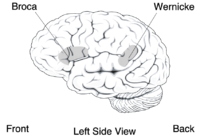Portal:Linguistics
- For a topical guide of this subject, see Outline of linguistics
Welcome to the Linguistics Portal!Linguistics is the scientific study of language. Linguistics is based on a theoretical as well as a descriptive study of language and is also interlinked with the applied fields of language studies and language learning, which entails the study of specific languages. Before the 20th century, linguistics evolved in conjunction with literary study and did not employ scientific methods. Modern-day linguistics is considered a science because it entails a comprehensive, systematic, objective, and precise analysis of all aspects of language – i.e., the cognitive, the social, the cultural, the psychological, the environmental, the biological, the literary, the grammatical, the paleographical, and the structural. Traditional areas of linguistic analysis correspond to syntax (rules governing the structure of sentences), semantics (meaning), morphology (structure of words), phonetics (speech sounds and equivalent gestures in sign languages), phonology (the abstract sound system of a particular language), and pragmatics (how social context contributes to meaning). Subdisciplines such as biolinguistics (the study of the biological variables and evolution of language) and psycholinguistics (the study of psychological factors in human language) bridge many of these divisions. Linguistics encompasses many branches and subfields that span both theoretical and practical applications. Theoretical linguistics (including traditional descriptive linguistics) is concerned with understanding the universal and fundamental nature of language and developing a general theoretical framework for describing it. Applied linguistics seeks to utilise the scientific findings of the study of language for practical purposes, such as developing methods of improving language education and literacy. Linguistic features may be studied through a variety of perspectives: synchronically (by describing the shifts in a language at a certain specific point of time) or diachronically (through the historical development of language over several periods of time), in monolinguals or in multilinguals, amongst children or amongst adults, in terms of how it is being learned or how it was acquired, as abstract objects or as cognitive structures, through written texts or through oral elicitation, and finally through mechanical data collection or through practical fieldwork. (Full article...) Selected article -Nafaanra is a Senufo language spoken in northwest Ghana, along the border with Côte d'Ivoire, east of Bondouko. It is spoken by approximately 61,000 people. Its speakers call themselves Nafana; others call them Banda or Mfantera. Like other Senufo languages, Nafaanra is a tonal language. It is somewhat of an outlier in the Senufo language group, with the geographically closest relatives, the Southern Senufo Tagwana-Djimini languages, approximately 200 kilometres to the west, on the other side of Comoé National Park. The basic word order is Subject Object Verb, similar to Latin and Japanese. Like other Niger-Congo languages it has a noun class system where nouns are classified according to five different genders, which also affects pronouns, adjectives and copulas. The phonology features a distinction between the length of vowels and whether they are oral or nasal (as in French or Portuguese). There are also three distinct tones, a feature shared with the other Senufo languages. Nafaanra grammar features both tense and aspect which are marked with particles. Numbers are mainly formed by adding cardinal numbers to the number 5 and by multiplying the numbers 10, 20 and 100. (more...) Did you know...From Wikipedia's "Did You Know" archives: 
Related PortalsThings you can do
WikiProjectsThe following WikiProjects work to improve topics concerned with linguistics:
Associated WikimediaThe following Wikimedia Foundation sister projects provide more on this subject:
Discover Wikipedia using portals |




























